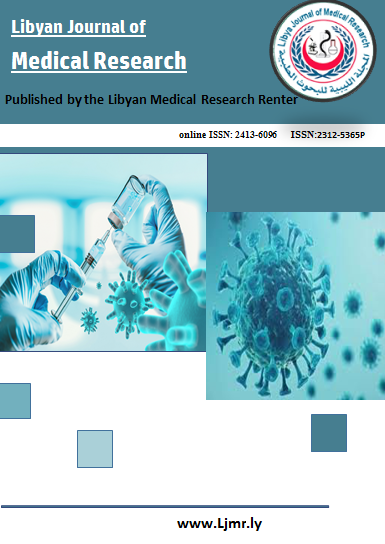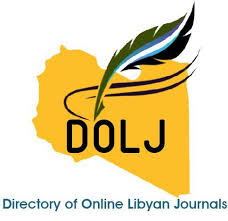Post-Traumatic Stress Disorder and Depression Among the Survivors of the Derna Flood 2023
DOI:
https://doi.org/10.54361/19.1.20Keywords:
disaster, flood, depression, post traumatic disorder, Derna, LibyaAbstract
Purpose: Natural disasters are catastrophic events that result from natural phenomena such as floods, the most recent and devastating natural disaster that affected Libya was the flood that occurred in September 2023 had a significant impacts on the mental health of the survivors, who may experience various psychological problems such as post-traumatic stress disorder (PTSD), depression that can impair the quality of life, Aim of study: Our research aim is to determine the prevalence of PTSD and depression among the adult survivors of the Derna flood.
Methodology: A descriptive cross sectional study was done online through Google forms from December 2023 to April 2024.
Result: The majority of respondents were male (86.4%), with females comprising a minority (13.6%). Regarding age distribution, approximately half of the participants (50.5%) were aged between 18 and 28 years. The findings revealed a high prevalence of PTSD symptoms among the participants, with 72.8% reporting experiencing symptoms consistent with PTSD Moreover, the majority of participants (82.5%) exhibited symptoms of depression, the level of depression was significantly associated with employment status.
Conclusion: our study underscores the substantial burden of PTSD and depression among survivors of the Derna flood in Libya. The findings highlight the urgent need for tailored mental health interventions and support services to address the psychological needs of survivors in the aftermath of natural disasters
Downloads
References
1: World Health Organization. Natural events: disasters. [Internet]. Geneva: World Health Organization; 2021 [cited 2023 Nov 30]. Available from: 1
2: Norris FH, Friedman MJ, Watson PJ, Byrne CM, Diaz E, Kaniasty K. 60,000 disaster victims speak: Part I. An empirical review of the empirical literature, 1981–2001. Psychiatry. 2002;65(3):207-39. doi: 2
3: El-Keblawy A, Al-Rawai A. Impacts of drought on the vegetation of two semi-arid regions in the United Arab Emirates and Qatar. J Arid Environ. 2007;68(3):499-511. doi: 9
4: Al Jazeera. Libya floods: At least 4,000 people displaced in Derna. [Internet]. Doha: Al Jazeera; 2023 Sep 25 [cited 2023 Nov 30]. Available from: 10
5: BBC News. Libya floods: Thousands left homeless after torrential rain. [Internet]. London: BBC News; 2023 Sep 24 [cited 2023 Nov 30]. Available from: 11
6: Reuters. Death toll from Libya floods rises to more than 4,000 - official. [Internet]. London: Reuters; 2023 Sep 26 [cited 2023 Nov 30]. Available from: 12
7: American Psychiatric Association. Diagnostic and statistical manual of mental disorders. 5th ed. Arlington, VA: American Psychiatric Association; 2013.
8: World Health Organization. Depression. [Internet]. Geneva: World Health Organization; 2020 [cited 2023 Nov 30]. Available from: 3
9: Neria Y, Nandi A, Galea S. Post-traumatic stress disorder following disasters: a systematic review. Psychol Med. 2008;38(4):467-80. doi: 6
10: Steel, Z., Marnane, C., Iranpour, C., Chey, T., Jackson, J. W., Patel, V., & Silove, D. (2014). The global prevalence of common mental disorders: a systematic review and meta-analysis 1980–2013. International Journal of Epidemiology, 43(2), 476–493.
11: Beaglehole B, Mulder RT, Frampton CM, Boden JM, Newton-Howes G, Bell CJ. Psychological distress and psychiatric disorder after natural disasters: systematic review and meta-analysis. Br J Psychiatry. 2018;213(6):716-22. doi: 7
12: Lowe SR, Bonumwezi JL, Valdespino-Hayden Z, Galea S. Posttraumatic stress and depression in the aftermath of environmental disasters: a review of quantitative studies published in 2018. Curr Environ Health Rep. 2019;6(4):344-60. doi: 8
13: World Health Organization. (2017). Depression and other common mental disorders: global health estimates. Geneva: World Health Organization.
14: Kessler RC, Sonnega A, Bromet E, Hughes M, Nelson CB. Posttraumatic stress disorder in the National Comorbidity Survey. Arch Gen Psychiatry. 1995;52(12):1048-60. doi: 4
15: Moussavi S, Chatterji S, Verdes E, Tandon A, Patel V, Ustun B. Depression, chronic diseases, and decrements in health: results from the World Health Surveys. Lancet. 2007;370(9590):851-8. doi: 561415-9)
16: Unicef Libya Humanitarian Situation Report No. 9 - Reporting Period: September 2023. [Internet]. Tripoli: UNICEF; 2023 Oct 5
17: Löw, A., Lotar Rihtarić, M., & Vrselja, I. (2023). Resource loss, coping strategies and post-traumatic stress disorder symptoms in survivors of the 2020 Croatia earthquake. BMC Psychology, 11, 128.
18: Suresh, S., Kumar, S., Kumar, S., & Kumar, S. (2022). A survey of Post-Traumatic Stress Disorder, Anxiety and Depression among Flood Affected Populations in Kerala, India. Journal of Evolution of Medical and Dental Sciences, 11(6), 407-411.
19: Khan, A., Khan, A., Khan, A., & Nawaz, A. (2012). Prevalence of post-traumatic stress disorder and depression among flood affected individuals in Pakistan. Journal of Pakistan Psychiatric Society, 9(2), 60-63.
20:Galea, S., Brewin, C. R., Gruber, M., Jones, R. T., King, D. W., King, L. A.,... & Kessler, R. C. (2007). Exposure to hurricane-related stressors and mental illness after Hurricane Katrina. Archives of General Psychiatry, 64(12), 1427–1434.
21: Wang, X., Gao, L., Zhang, H., Zhao, C., Shen, Y., & Shinfuku, N. (2013). Post-earthquake quality of life and psychological well-being: Longitudinal evaluation in a rural community sample in northern China. Psychiatry and Clinical Neurosciences, 67(1), 105–112.
Downloads
Published
Issue
Section
License
Copyright (c) 2025 Amina Muftah Elsaid, Naji Mustafa Boshaala (Author)

This work is licensed under a Creative Commons Attribution-NonCommercial-NoDerivatives 4.0 International License.
Open Access Policy
Libyan journal of medical Research (LJMR).is an open journal, therefore there are no fees required for downloading any publication from the journal website by authors, readers, and institution.
The journal applies the license of CC BY (a Creative Commons Attribution 4.0 International license). This license allows authors to keep ownership f the copyright of their papers. But this license permits any user to download , print out, extract, reuse, archive, and distribute the article, so long as appropriate credit is given to the authors and the source of the work.
The license ensures that the article will be available as widely as possible and that the article can be included in any scientific archive.
Editorial Policy
The publication of an article in a peer reviewed journal is an essential model for Libyan journal of medical Research (LJMR). It is necessary to agree upon standards of expected ethical behavior for all parties involved in the act of publishing: the author, the journal editorial, the peer reviewer and the publisher.
Any manuscript or substantial parts of it, submitted to the journal must not be under consideration by any other journal. In general, the manuscript should not have already been published in any journal or other citable form, although it may have been deposited on a preprint server. Authors are required to ensure that no material submitted as part of a manuscript infringes existing copyrights, or the rights of a third party.
Authorship Policy
The manuscript authorship should be limited to those who have made a significant contribution and intellectual input to the research submitted to the journal, including design, performance, interpretation of the reported study, and writing the manuscript. All those who have made significant contributions should be listed as co-authors.
Others who have participated in certain substantive aspects of the manuscript but without intellectual input should only be recognized in the acknowledgements section of the manuscript. Also, one of the authors should be selected as the corresponding author to communicate with the journal and approve the final version of the manuscript for publication in the LJMR.
Peer-review Policy
- All the manuscripts submitted to LJMR will be subjected to the double-blinded peer-review process;
- The manuscript will be reviewed by two suitable experts in the respective subject area.
- Reports of all the reviewers will be considered while deciding on acceptance/revision or rejection of a manuscript.
- Editor-In-Chief will make the final decision, based on the reviewer’s comments.
- Editor-In-Chief can ask one or more advisory board members for their suggestions upon a manuscript, before making the final decision.
- Associate editor and review editors provide administrative support to maintain the integrity of the peer-review process.
- In case, authors challenge the editor’s negative decision with suitable arguments, the manuscript can be sent to one more reviewer and the final decision will be made based upon his recommendations.












 https://portal.issn.org/resource/ISSN/2413-6069
https://portal.issn.org/resource/ISSN/2413-6069


